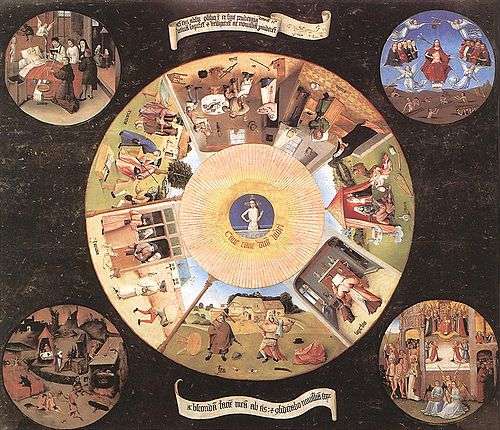Hamartiology
Hamartiology (from Greek: ἁμαρτία, hamartia, "missing the mark, error" and -λογια, -logia, "study"), a branch of Christian theology, studies sin.[1]
Original sin
Substantial branches of hamartiological understanding, including Roman Catholic,[2] Presbyterian,[3] Continental Reformed,[4] and Reformed Baptist[5] subscribe to the doctrine of original sin,[6] which the Apostle Paul espouses in Romans 5:12-19 and which Augustine of Hippo popularized in the West and developed into a notion of "hereditary guilt". The North African bishop taught that God holds all the descendants of Adam and Eve accountable for Adam's sin of rebellion, and as such all people deserve God's wrath and condemnation – apart from any actual sins they personally commit.[7]
In contrast, a view sometimes ascribed to Pelagius states that humans enter life as moral "blank slates" (tabulae rasae) responsible for their own moral nature. The Fall that occurred when Adam and Eve disobeyed God, according to Pelagianism, affected humankind only minimally as it established a negative moral precedent. Few contemporary theologians (especially thinkers in Augustinian traditions) and no orthodox theologians, however, continue to hold this hamartiological viewpoint.
A third branch of thinking takes an intermediate position, asserting that since the Fall the sin of Adam has naturally impacted human beings such that they have inborn tendencies to rebel against God (in which rebellion by personal choice all accountable humans, except Jesus, will choose or have chosen to indulge). This is the hamartiological position of the Eastern Christian churches, often called ancestral sin as opposed to original sin, but it is sometimes viewed as Semipelagian in the West, especially by the Reformed.
How individual Christians believe that either a literal or metaphorical "Fall" has impacted humanity typically forms the foundation for their views on related theological concepts such as salvation, justification, and sanctification.
See also
References
- ↑ "Hamartiology - Define Hamartiology at Dictionary.com". Dictionary.com. Retrieved 20 November 2014.
- ↑ "Catechism of the Catholic Church - PART 1 SECTION 2 CHAPTER 1 ARTICLE 1 PARAGRAPH 7". Scborromeo.org. Retrieved 2014-08-21.
- ↑ "Historic Church Documents at". Reformed.org. Retrieved 2014-08-21.
- ↑ "Historic Church Documents at". Reformed.org. Retrieved 2014-08-21.
- ↑ "THE BAPTIST CONFESSION OF FAITH" (PDF). Rblist.org. Retrieved 20 November 2014.
- ↑ "Calvin". History.hanover.edu. Retrieved 2014-08-21.
- ↑ Bavink, Herman. Reformed Dogmatics Vol. 3. (Grand Rapids: Baker Academic, 2004) Pages 75-125 detail the historical development of Hamartiology, including Pelagius's position and the mediating positions)
External links
| Look up hamartiology in Wiktionary, the free dictionary. |
